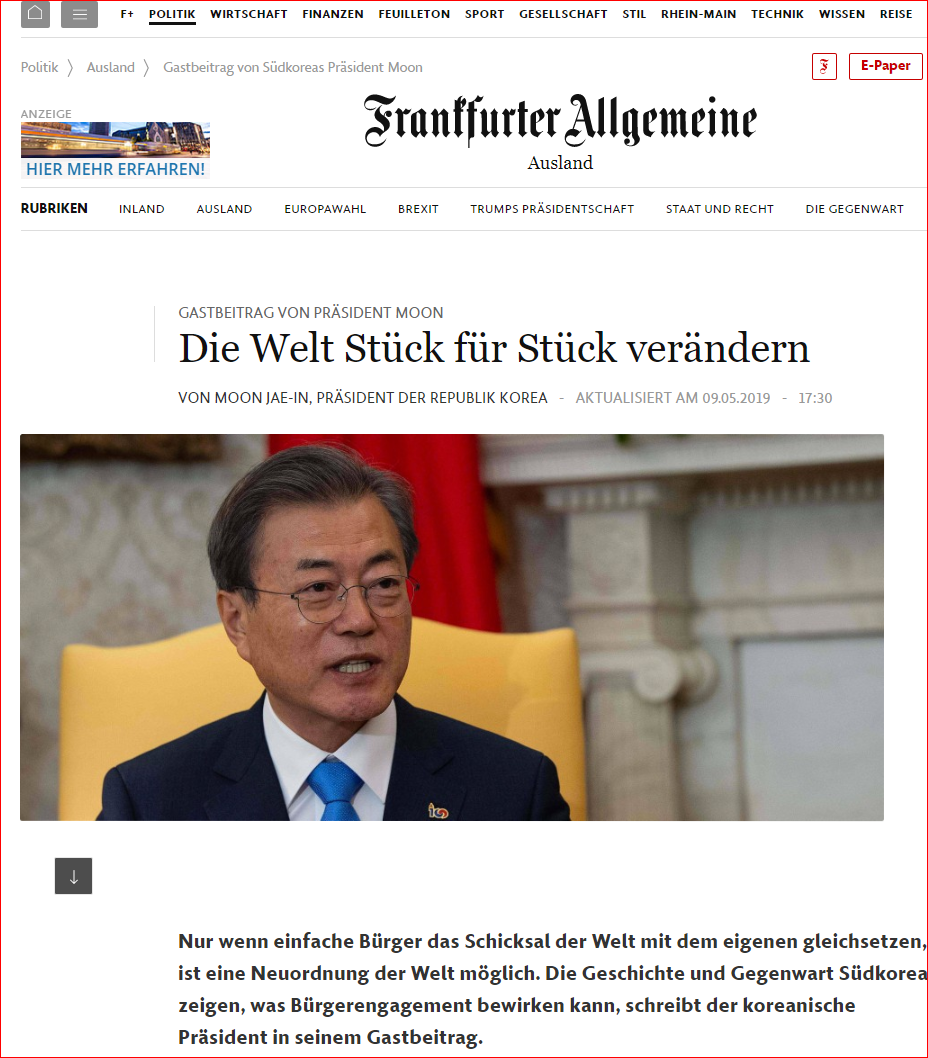hankyoreh
Links to other country sites 다른 나라 사이트 링크
Moon emphasizes peace and “New Korean Peninsula” system in column for German paper

“The New Korean Peninsula System is a peace economy based on a virtuous cycle in which peace leads to economic development, further reinforcing peace. The foundation for this achievement is the will of ordinary people,” South Korean President Moon Jae-in said on May 7.
“Inter-Korean issues must not be exploited for ideology and politics, and they must be expanded to deal with the lives and safety of ordinary people,” Moon said in a column submitted to the Frankfurter Allgemeine Zeitung, a German newspaper, on May 6, which was the second anniversary of his inauguration as president.
“South and North Korea must coexist as part of a ‘living community.’ If South and North Korea become reconciled, build railroads, and allow goods to be exchanged and people to travel freely across the border, South Korea will become not an island but a bridgehead for advancing from the ocean into the continent of Asia, as well as a gateway from the continent to the ocean. The broadening of ordinary people’s imagination also signifies their liberation from ideology,” Moon said.
“When linked with our neighbors, the activation of inter-Korean economic exchange can facilitate the Korean Peninsula’s transformation into an economic corridor not only to East Asia but also to Eurasia. I hope to show the world that achieving peace ultimately begins with, and can be completed through, the will of ordinary people.”
Moon reiterated that the starting point for the New Korean Peninsula System is the complete denuclearization of the Korean Peninsula and the establishment of diplomatic relations between North Korea and the US. “When dialogue between North Korea and the US brings about complete denuclearization and diplomatic relations are established, and when the armistice agreement is fully replaced with a peace treaty, only then will the Cold War alignment collapse and a new peace regime come into being on the Korean Peninsula,” Moon said, in an implicit call for North Korea-US dialogue, which has been deadlocked since the Hanoi summit.
“The New Korean Peninsula System signifies the conversion from the passive order of the Cold War to an active order of peace. In the past, the Korean people were unable to determine their own future because of Japan’s occupation of the peninsula and because of the Cold War, but now, we are seeking to carve out our own destiny. This means that ordinary people are becoming the masters of their own destiny,” Moon said.
In his column, Moon explained how ordinary Koreans have taken just and peaceful action at every historical crisis, achieving democracy and economic development. Moon explained that the Gwangju Democratization Movement in 1980 had taught him that “moral action is the greatest action that can be exhibited in resisting government injustice.”
“During the Candlelit Revolution, ordinary people once again defended democracy through the most peaceable of means,” Moon added.
Moon’s column is scheduled to be printed in Germany toward the end of May in a collection tentatively titled “The New World Order” along with columns by business and religious leaders and the heads of state of important countries, including Chinese President Xi Jinping.
By Seong Yeon-cheol, staff reporter
Please direct comments or questions to [english@hani.co.kr]
Editorial・opinion
![[Column] Park Geun-hye déjà vu in Yoon Suk-yeol [Column] Park Geun-hye déjà vu in Yoon Suk-yeol](https://flexible.img.hani.co.kr/flexible/normal/500/300/imgdb/original/2024/0424/651713945113788.jpg) [Column] Park Geun-hye déjà vu in Yoon Suk-yeol
[Column] Park Geun-hye déjà vu in Yoon Suk-yeol![[Editorial] New weight of N. Korea’s nuclear threats makes dialogue all the more urgent [Editorial] New weight of N. Korea’s nuclear threats makes dialogue all the more urgent](https://flexible.img.hani.co.kr/flexible/normal/500/300/imgdb/original/2024/0424/7317139454662664.jpg) [Editorial] New weight of N. Korea’s nuclear threats makes dialogue all the more urgent
[Editorial] New weight of N. Korea’s nuclear threats makes dialogue all the more urgent- [Guest essay] The real reason Korea’s new right wants to dub Rhee a founding father
- [Column] ‘Choson’: Is it time we start referring to N. Korea in its own terms?
- [Editorial] Japan’s rewriting of history with Korea has gone too far
- [Column] The president’s questionable capacity for dialogue
- [Column] Are chaebol firms just pizza pies for families to divvy up as they please?
- [Column] Has Korea, too, crossed the Rubicon on China?
- [Correspondent’s column] In Japan’s alliance with US, echoes of its past alliances with UK
- [Editorial] Does Yoon think the Korean public is wrong?
Most viewed articles
- 1‘We must say no’: Seoul defense chief on Korean, USFK involvement in hypothetical Taiwan crisis
- 2[Reportage] On US campuses, student risk arrest as they call for divestment from Israel
- 3[Column] Park Geun-hye déjà vu in Yoon Suk-yeol
- 4‘Weddingflation’ breaks the bank for Korean couples-to-be
- 5Korea sees more deaths than births for 52nd consecutive month in February
- 6N. Korean delegation’s trip to Iran shows how Pyongyang is leveraging ties with Moscow
- 7Amnesty notes ‘erosion’ of freedom of expression in Korea in annual human rights report
- 8Will NewJeans end up collateral damage in internal feud at K-pop juggernaut Hybe?
- 9N. Korean hackers breached 10 defense contractors in South for months, police say
- 10[Guest essay] The real reason Korea’s new right wants to dub Rhee a founding father